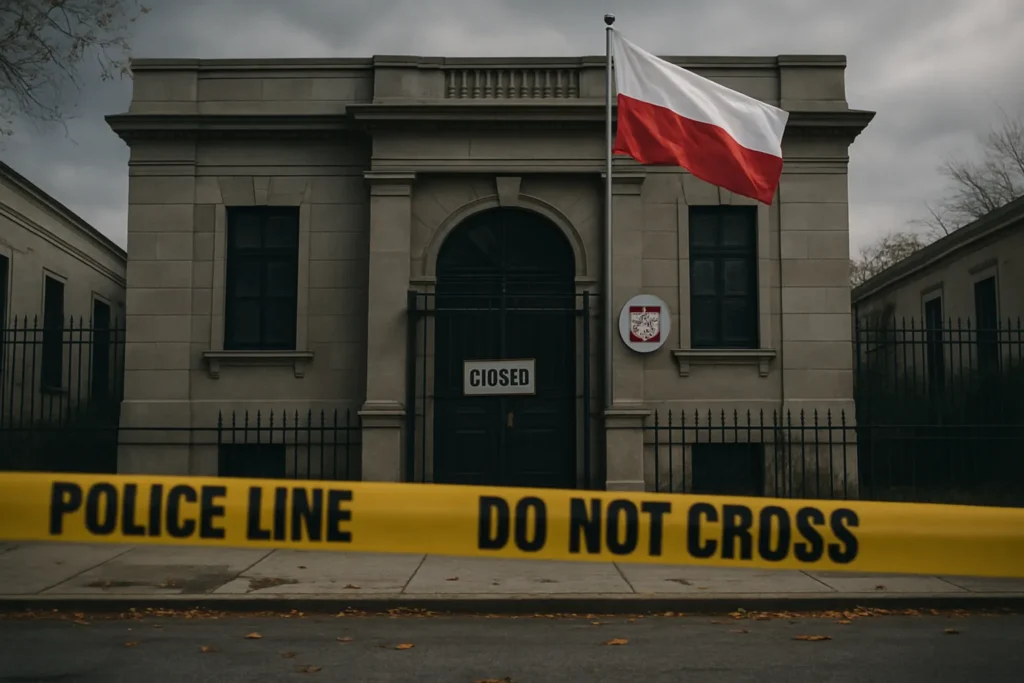Sabotage, Diplomacy, and the Flashpoint in Krakow
Thick smoke billowed over Warsaw’s Marywilska 44 shopping center on May 12, 2024—a devastating blaze that gutted its vast expanse, home to more than 1,400 shops and service points. For many Polish residents, the sight was shocking, but for the city’s thriving Vietnamese community, it was a catastrophe: generations of entrepreneurs saw their livelihoods instantly reduced to ashes. Weeks later, a new conflagration erupted, this time diplomatic, when Polish officials definitively tied the fire to Russian special services, describing it as a “reprehensible act of sabotage.” The response was swift and unequivocal. Polish Foreign Minister Radosław Sikorski withdrew consent for the Russian consulate’s operation in Krakow—a historic rupture, reverberating beyond simple tit-for-tat protocol and thrusting Poland-Russia relations to their lowest point in decades.
What prompted this stunning escalation? According to Prime Minister Donald Tusk, Polish authorities had “no doubt” regarding Russian orchestration of the arson, citing compelling evidence and confirming that some of the perpetrators were already in custody, with others pursued. The fire at Marywilska 44 was not just criminal; it was geopolitical theater. Russia, for its part, condemned the closure as a deliberate antagonism, promising unspecified retaliation—but the roots of this crisis run deeper than one embassy or one fire.
Russian Covert Operations: An Old Playbook, New Consequences
Tensions between Warsaw and Moscow rarely simmer out altogether, but this chapter brings echoes of Cold War intrigue uncomfortably close to home. Confronted with mounting evidence of direct Russian involvement in destabilizing activities, many European leaders warn of a pattern of covert operations stretching from cyberattacks to disinformation campaigns—and now, apparently, outright physical sabotage. Historian Anne Applebaum, a longtime observer of Russian-Western relations, draws a chilling parallel: “Each provocation serves to test the West’s resolve and to probe for weakness.”
The Marywilska 44 fire is notable both for its scale and its human cost. Beyond headlines, those most hurt are ordinary people—immigrants, shopkeepers, families—who, according to a report by the Warsaw Vietnamese Association, lost not just property but “the center of daily life and cultural connection.” When Polish investigators revealed that the suspected arsonists were directed from Russia, it propelled the incident from tragedy to scandal. To progressive eyes, the implications are clear: an attack on civil society itself, targeting diversity and inclusion, and seeking to send a message of intimidation amid rising multiculturalism in Central Europe.
“When foreign sabotage upends lives and seeks to sew fear in our communities, we must respond not only with resolve but with solidarity. Democratic institutions cannot afford to be timid in the face of such aggression.”
— Polish Foreign Minister Radosław Sikorski, May 2024
Diplomatic retaliation is nothing new—Russia and Western nations have traded expulsions and closures over alleged intelligence activities for decades. Yet, as Harvard’s Professor of International Law Gabriella Coyle points out, this latest salvo is remarkable for its brazenness and for the public nature of the evidence cited by Polish officials. “It signals a turning point,” Coyle notes—”covert attacks will increasingly result in open, public consequences in the diplomatic arena.”
Escalating Hostility and the Cost of Democratic Vigilance
Poland’s closure of the consulate sends a clear message: attempts to destabilize free societies—whether by hacking votes, sowing fear, or, as here, burning commercial centers—will not go unanswered. Yet the risks of escalation are real. Russia’s Foreign Ministry, led by spokesperson Maria Zakharova, has already vowed retaliation, fueling speculation about countermeasures ranging from Polish diplomat expulsions to economic reprisals or other asymmetric actions. Geopolitical strategists warn that such diplomatic blows both expose and amplify vulnerabilities across Europe.
Supporters of Poland’s decisive move argue that failure to act emboldens bad actors. The European Union, while stopping short of coordinated expulsions, affirmed solidarity, with senior EU diplomat Josep Borrell warning: “Europe must not be neutral when democracy is attacked.” But critics worry about unintended consequences. Minority communities, already reeling from the fire, now face uncertainty as hostilities ratchet higher. As we have seen throughout history—from the Soviet clampdowns of the late 20th century to more recent tit-for-tat expulsions between Russia and the UK—diplomatic disputes rarely end cleanly.
Yet ignoring attacks on the very fabric of civil society is not an option. Poland’s assertive response embodies a broader European awakening: authoritarian regimes are no longer content with virtual interference. “They’re crossing lines we used to imagine were sacrosanct—businesses, communities, basic public safety,” says former NATO analyst Anna Nowak. Sanctions, expulsions, and the closure of consulates may not end the cycle, but they serve as both warning and protective measure—demonstrating that democratic resilience, in the face of sabotage, requires real costs for aggressors.
The path forward is fraught and demands vigilance, cooperation, and honestly, a bit of courage. When pressure mounts, who do we stand with—the saboteur, or the shopkeeper who rebuilt from ashes? Recent events in Krakow and Warsaw offer a stark reminder: the defense of democracy begins at home, but its implications are global.

